SACRAMENTO, Calif — Garth Schutte, 40, has been taken by the state.
His mother, Jill, and older brothers, Ian and Russell, aren't allowed to speak to or see Garth. They don't know where he lives.
That's because Garth has been placed under a limited conservatorship.
In California, a conservatorship is a legal tool approved through the probate court which takes away the rights of someone who is unable to care for themselves and gives them to another person.
While general conservatorships strip someone of their civil rights entirely, limited conservatorships have seven separate powers that can be taken and given to another person depending on the conserved person’s unique needs and ability to handle certain aspects of their lives.
But Garth has not been conserved by just anyone; he is under the custody of a $12 billion state agency: The Department of Developmental Services (DDS).
DDS serves hundreds of thousands of Californians with disabilities and their families with services and support. The Schutte family shared their story with us in hopes it will shine a light for others who receive these services — especially those considering conservatorship.
“360,000 people could potentially be subject to this system,” said Ian.
360,000 is the number of people the Department of Developmental Services serves as of our interview. In 2023, that number is expected to increase to over 400,000.
“I want to help as many of those 360,000 people as I can because even it just happening to one person is awful,” said Ian.
“We never expected anything like this,” said Jill. “If I could’ve predicted this... we would’ve left the state of California.”
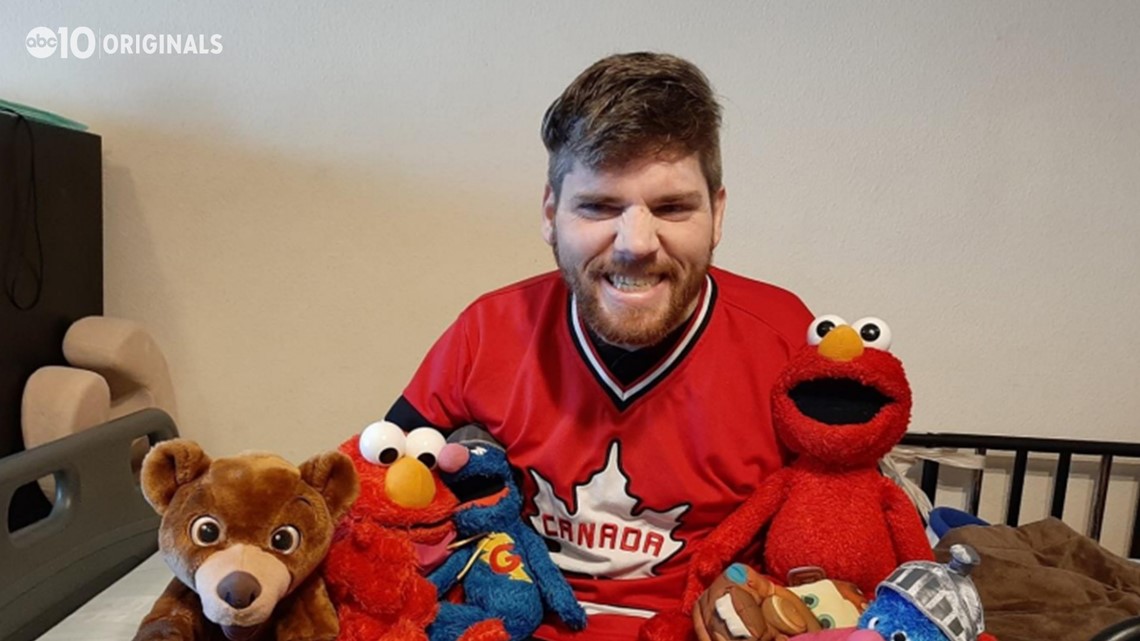
Garth has developmental disabilities; autism and obsessive-compulsive disorder, court and medical records show. For the first 39 years of his life, he relied on his mother to assist him with everyday things like showering, shaving and even using a catheter because of a diagnosis of catatonia.
“He was catheterized in the home and I was trained by three different medical staff,” said Jill. “Kaiser was providing all his medicine and his catheter, which was being mailed to the house. You can’t buy catheters — they’re prescription only.”
The catheter is part of how Garth’s conservatorship began.
In Aug. 2020, record-breaking heat hit Sacramento. Jill noticed Garth wasn't eating or drinking quite as much and took him to the doctor.
“Garth says things differently and he mentioned to one of the nurses, ‘My mom puts a red plastic straw in my private part,'" Jill said.
Hospital staff are mandatory reporters. By law they have to report any sign of potential abuse – Jill said Garth was trying to explain how he needed to be catheterized and it sent an abuse alert to Sacramento Adult Protective Services (APS) as well as Alta Regional Center — the state-run facility under DDS providing services and support directly to people with disabilities as well as their families.
Photos: Life for Garth prior to conservatorship
“When we look at California state law regarding mandated reporters, the reporters only report suspicions. It’s the sheriff and police that do the investigation,” said Jill. “Adult Protective Services expand the investigation, not the regional center.”
Yet court records show Alta Regional Center took Garth and placed him in a state-funded care facility.
Jill, Ian and Russell were not notified, despite Jill having Kaiser’s model of power of attorney over Garth.
For three months, no one told their family where Garth was.
“We had absolutely no idea. They would not even say, is he in Sacramento?” Jill said. “We did not know.”
This wasn’t unfamiliar territory to the Schutte family.
Fifteen years prior, Garth had been taken by an Alta Regional Center employee who was helping watch Garth in Jill’s home. In court records, the regional center wrote Jill was unable to care for Garth, but a court investigator’s report later said Garth was taken in a “deceptive” manner.
The first time Garth was taken, it took Jill nine months and an attorney to get him back. 15 years later, in 2020, they were at a loss, which is why the Schutte family decided to get conservatorship over Garth, despite not doing so for Garth’s 39 years of life to help maintain his independence.
As they began the lengthy legal process, Garth was suddenly dropped off at Jill’s home by medical technicians after three months with no knowledge of his whereabouts.
“I was shocked. I was thrilled,” said Jill.
Less than 24 hours later, three Sacramento sheriff’s deputies arrived saying Garth had been returned to Jill due to a “clerical error.”
The deputies took Garth outside and spoke with him alone. Ian recorded all 47 minutes the deputies were there; throughout the recording, Garth expressed his desire to remain at home with his mother to the deputies several times.
After Garth made his wishes clear and the deputies did a home inspection, their concern vanished.
“We’re glad he’s got such a good home here,” a deputy said.
The deputies updated Adult Protective Services and Alta Regional Center on their welfare check. Before leaving, one deputy offered the Schutte’s advice: “The most important thing you can do is go get that conservatorship as quickly as you can because that’ll prevent them from pulling all this.”
The Schutte family took it to heart and moved forward with the legal conservatorship process.
By petitioning the probate court for conservatorship, several things are instigated, including the court appointing an attorney for the potential conserved person.
The court appointed attorney Dewey Harpainter to represent Garth. Harpainter’s office is in Auburn.
As Garth’s attorney, Harpainter is legally required to advocate and represent what Garth wants. Jill says Harpainter refused to meet in person with Garth.
“At one point I said, ‘If you’d like I can drive Garth up to Auburn. I will sit in the car so you can have private questioning with him,'” Jill said. “He denied that at least five times.”
When the Schutte family attorney brought this up in court and requested a new attorney be appointed for Garth, the judge refused, Jill said and court records show.
At the time of our interview with the Schutte family in early June 2022, Harpainter had yet to meet with Garth.
That changed less than a month later after we reached out for an interview. Court records show Harpainter eventually met in person with Garth after we began investigating. The meeting took place just six days after our initial interview request to Harpainter.
Harpainter did not respond to repeated requests for an interview.
When a conservatorship is requested – the court also appoints an investigator to interview the conservatee, assess the family dynamic, and write a report that goes directly to the judge.
“The court investigator called me and we talked over many, many things,” said Jill. “I (also) encouraged him to talk to Garth privately.”
After the investigator spoke with Garth in a one-on-one phone call, he wrote that Garth “expressed a very strong desire to remain at home” and told the investigator, “(I) don’t wanna go to a group home. I would like to live at home.”
Criminal background checks were done on Jill and Russell — who were petitioning for shared conservatorship custody. The investigator’s report also went through Adult Protective Services records and past abuse referrals, which “were deemed inconclusive.”
It means they didn’t have evidence to confirm or deny Garth was abused, APS told us.
The court investigator recommended to the judge that his family care for Garth, and the conservatorship “should be granted.”
But the state regional center, Alta, told the judge a different story — it claimed a number of allegations of abuse by the family from medical professionals in their written assessment of Garth.
Jill said she’s had years of experience with Garth — as well as a 22-year career as a disability expert for the California State of Rehabilitation — and that, “at no time did any doctor or professional advise me that anything being done was abusive.”
The assessment also alleged Jill locked Garth in a windowless room, which Jill admits to, for Garth’s own protection. Because of his OCD, Garth often tries to break through the window glass in his room so he can pick up litter at all times of the day and night.
“I mentioned that to a doctor… the doctor said, ‘Can you put a plywood or something based on the size of the window?’” Jill recalled.
She did, but not before she said she consulted with the fire department about it.
“It’s always putting Garth first,” Jill said. “His needs and wants but above his needs and wants... his safety.”
The assessment also said Garth spoke directly to Roseville police after a lieutenant contacted Garth and the regional center following the Schutte's filing a missing persons report when Garth was taken in 2020. The assessment said Garth told the lieutenant he didn't want to return to his mother’s house as well as recounted “physical and sexual abuse by his mother and brother.”
We reached out to the Roseville Police Department. They said they have “no records” of the call and therefore couldn’t confirm it.
The regional center told the judge just because APS reports of abuse were “inconclusive,” it “does not mean the claims are unfounded” and that Jill and Russell would be inappropriate conservators.
Instead, they recommended the Department of Developmental Services be appointed as conservator. They also said DDS should ask for a power the family didn’t: control over who Garth sees.
Ultimately, the judge listened to the regional center. He gave temporary conservatorship of Garth to DDS... not to the family as recommended by the court investigator.
With the conservatorship appointed, DDS decided Garth should move out of his mother’s home and into one of their care facilities — what they call a “vendor.”
After 39 years of living with Garth, Jill moved Garth into the new facility.
“We did not want him to see our tears as we drove away,” Jill recalled.
But the DDS care home struggled with Garth.
“Because they couldn’t help him sleep and he couldn’t sleep - they call 911,” Jill said she learned.
Court records show Garth had been “hospitalized for 43 out of 88 days” after being moved to care homes and under the care of DDS, meaning between November 2021 and February 2022 Garth spent about half his time at that point in emergency rooms rather than the care home.
Because Garth is under the conservatorship of DDS, taxpayers are footing the pricey ambulance rides and hospital stays.
One of the caretakers had so much trouble she actually asked for help from the family Garth had just been taken away from.
“She would call (us asking), ‘Can we come help her?’” Jill said. “She actually wanted us to spend the night there.”
Jill shared text messages between her and the care home facilitator with us. Here are a few, including the facilitator addressing the regional center’s abuse allegations:
- “Please help me tonight. I don’t want to call the hospital.”
- “Ms. Jill please help me.”
- “What would u do?”
- “I didn’t see any abuse at all.”
- “I believe u are a good family.”
- “I really don’t know what they (regional center) are doing. Just help me transition (him).”
- “He keeps writing I miss my mom.”
Garth no longer lives at this care home. Jill said he has moved residences five times in six months. With each move, Jill’s involvement in Garth’s life has been drastically cut by DDS, claiming Jill and Ian are “triggering” Garth. Jill believes what’s triggering is the memory of the home Garth had with her.
As of mid-July 2022, Jill hadn’t seen or spoken with Garth for 12 weeks. Visitation, including phone calls, between Garth and his family, has been severed... especially between Jill and Russel, the two who tried to get co-conservatorship.
“We have not been (to his care home). We are not allowed to go there. We are not allowed to know the exact address,” said Jill. “We have not seen him or heard from him.”
It’s not for a lack of trying; Jill has repeatedly requested visitation with Garth’s regional center service coordinator, who is acting as his conservator in making decisions for Garth on behalf of DDS.
“We can’t provide you a date when you will be able to call or visit Garth,” his service coordinator wrote in an email to Jill. She also said, “Garth has not expressed any interest in having contact with you at this time.”
Jill said she’ll respect his wishes, but wants to hear them from Garth himself.
“Because we will follow the instructions,” said Jill. “[The regional center] could not do that.”
We also reached out to Garth’s service coordinator asking to speak with Garth. Alta Regional Center’s legal manager responded with the same message: “Garth has expressed no interest in speaking with you.”
We asked if Garth was informed that an investigative reporter wanted to speak with him — and if we could ask him directly. We never got a response.
We were, however, able to speak with Garth directly during a visitation with his brother Russell.
Since DDS got conservatorship, Russell has laid low in hopes of continuing to remain in contact with Garth, unlike other family members who've lost all visitation. As of June 2022 he hadn't seen Garth for six months. Russell requested visitation and was approved. He, his wife Elizabeth, and their kids met at a local park while a care home worker supervised.
About halfway through their visit, we were able to speak with Garth.
“I terribly miss my mom,” Garth said.
When asked who he would like to live with, he told us “his family,” specifically his “mom.”
Garth also expressed the same desire weeks later directly to a judge.
On July 27, 2022, the Department of Developmental Services’ temporary conservatorship over Garth expired. The agency wanted to renew it and a court hearing was held in Sacramento’s probate court.
Judge Gevercer granted us permission to film, despite DDS’s repeated objections.
During the 40-minute hearing, the judge gave time for all to speak including Garth himself, who until this point has rarely had a voice in court.
“I want to live with my mom,” Garth said to the judge.
The judge told Garth to talk to his court-appointed attorney, Harpainter, about his desires. He also ordered DDS and the Schutte’s to meet and hopefully reach an agreement over Garth’s current situation.
In the meantime, he extended DDS’s conservatorship over Garth until the next hearing in December.
We requested an on-camera interview with the Department of Developmental Services for seven months. They declined all requests for interviews.
Prior to releasing our investigation, we sent them a three-page letter outlining our findings and asking 15 questions related to allegations of failed practices, including a 2022 state audit that found numerous failures for the last 10 years.
They refused to answer our questions and sent us a written statement (available in full at the bottom of this article) about how their priority was to keep their clients safe and a short video (below) of Director Nancy Bergmann reading the written statement. Neither answered any of our questions.
So, we attempted to talk to DDS attorney Meredith Nixon following the hearing. She also refused saying, “no comment.”
Two days prior to our investigation airing, the Department of Developmental Services announced immediate "actions to support" the individuals they conserve in a three-page press release. The release named three items DDS will do to improve the system for those in "conservatorships where DDS is the court-appointed conservator." They include forming a panel of experts to conduct a review of DDS' conservatorship program, forming a "working group" from multiple state departments to review their conservatorships, and "enhance oversight and review."
However, the press release didn't include direct actions or steps, like budgeting nor an exact time frame of when these items will take place. We reached out again asking for an interview so we could ask about the specifics of their new plan. They declined.
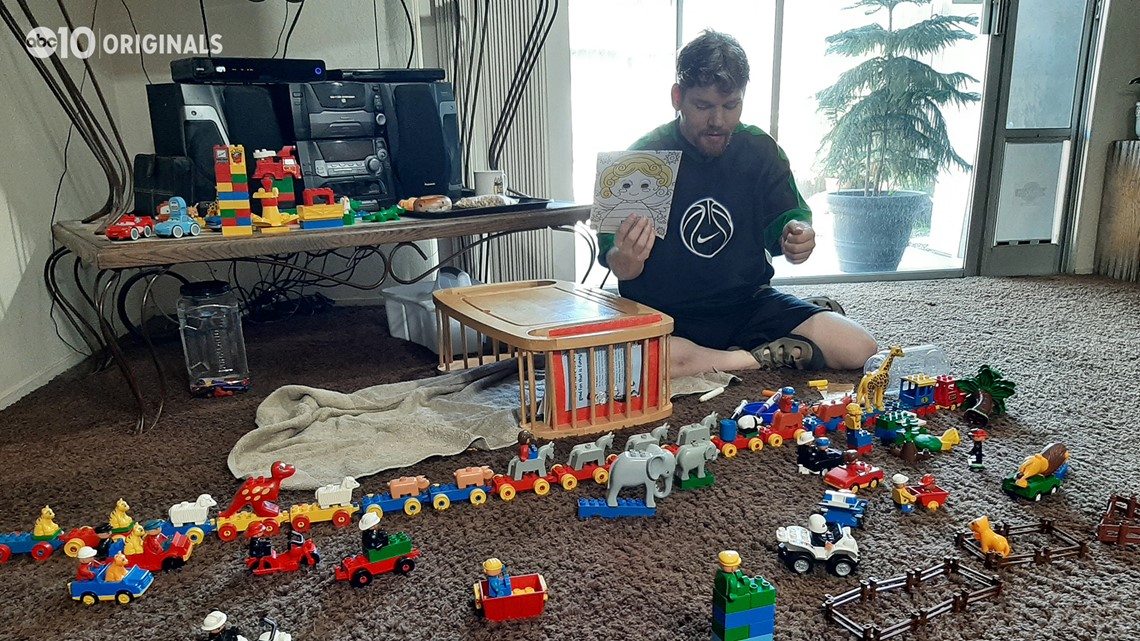
Jill had retired to care and spend more time with Garth. Following the hearing, she decided to return to work at an organization assisting people with autism, like Garth, so she can continue paying for the costly legal fees in hopes of gaining care for Garth.
The Schutte family plans to continue fighting in hopes of getting Garth home. They also hope in sharing their story, they shed a light on limited conservatorships and the system around it for others - as well as taxpayers.
Department of Developmental Services statement:
“In California, unlike any other state in the nation, individuals with intellectual and developmental disabilities have a right to the services and supports to help them live their most independent and productive life. With the passage of the ground-breaking Lanterman Act in 1969, the state affirmed its commitment to these rights for Californians. We at the California Department of Developmental Services have the responsibility to deliver on the assurances made by the law.
It is our obligation to hold ourselves and our system partners accountable, while ensuring that individuals with intellectual and developmental disabilities receive community-based services and supports that embraces choice and allows them to live with purpose and dignity. We are constantly looking to improve how we serve the whole person, all while protecting the health and well-being of those we serve.
We are striving to create effective, culturally responsive, and efficient services. We have advanced this vision by the historic investments made over the last two years that, when put together, drive us toward a system of value-based services and supports, where our main objective is quality and better outcomes.”
Department of Developmental Services response to our questions:
“DDS does not actively seek conservatorships. In all instances, the Department of Developmental Services’(DDS) involvement in the conservatorship process begins with a submission by a third party requesting that the Director of DDS become conservator of a person with developmental disabilities. DDS only decides to petition to become conservator when clear and convincing evidence shows that a conservatorship is needed to protect the consumer’s health, safety, or well-being. The submission can come from a variety of sources, such as the courts, a regional center, a law enforcement agency, a family member, the county public guardian, the consumer’s court-appointed counsel, local adult protective services, or any other person interested in the consumer’s health, safety, or well-being. The conservatorship process is a court-based, legal process. As such, DDS has the legal burden to present conclusive evidence to a judge demonstrating that the conservatorship is necessary to protect the person’s health, safety or well-being.
Family members can and do participate in the judicial proceedings that decide whether a conservatorship petition should be granted, the scope of the conservatorship, and whether the Director of DDS should be appointed as conservator. Furthermore, a court-appointed counsel is part of this process. These are officers of the court appointed by a judge to represent the interests of the proposed conservatee. These counsels are completely independent of DDS and do not receive any funds from the Department. Court-appointed counsel have a fiduciary duty to act independently and in the best interest of the proposed conservatee to determine whether a conservatorship is necessary and who, if anyone, should serve as conservator.
DDS does not seek to become a person’s conservator without a third-party submission having first being made and thoroughly vetted. DDS conducts a comprehensive, detailed inquiry when it receives a conservatorship nomination. DDS will not seek to become conservator if there are alternate, less restrictive means to protect a consumer’s health, safety, or well-being. DDS also will not seek to become conservator if there is a family member, friend or other close person in the consumer’s life that can protect the consumer’s health, safety or well-being. DDS has a legal and moral obligation to protect the consumer no matter the desires or objections from family members.
It is important to understand that under state law every regional center consumer participates in the development of an Individual Program Plan (IPP) that identifies the supports and services the person needs. An IPP is developed regardless of the legal status of individuals. The amount of funds spent on a consumer is based on costs for the supports and services identified in the IPP, and not on any other factor such as whether a conservatorship is in place. Thus, absolutely no additional funds are spent simply because a consumer is subject to a conservatorship by DDS. In addition, neither DDS nor the regional center receives any additional administrative funding for individuals who are conserved versus those who are not conserved.”
Editor's note: This article has been updated to correct that Russell
was the Schutte brother that initially petitioned co-conservatorship of
Garth.

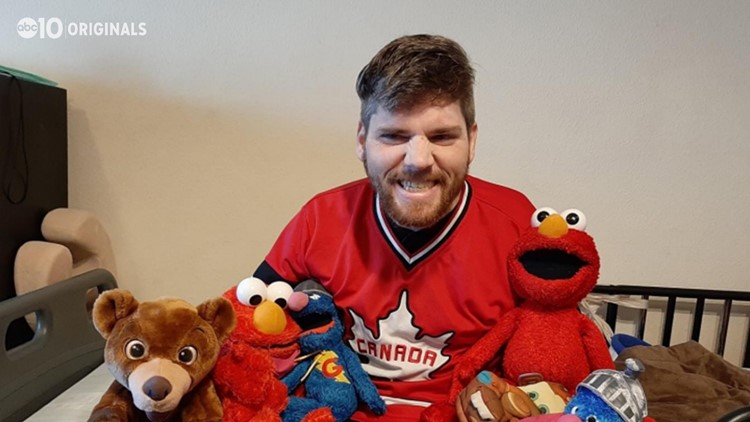
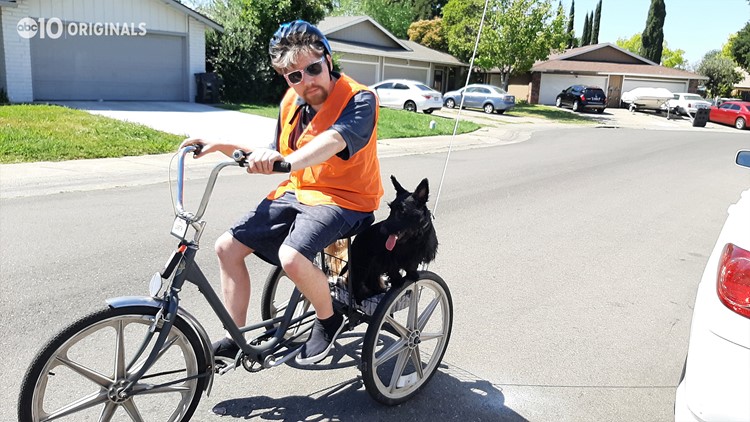
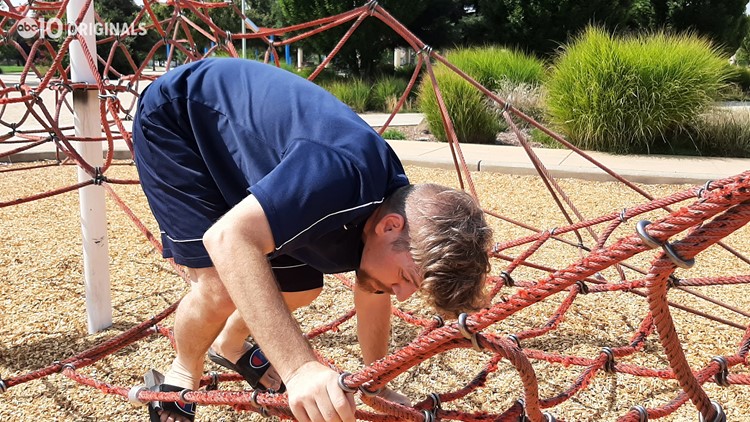
I pray Garth is returned to his loving family.
ReplyDelete